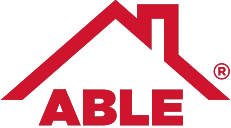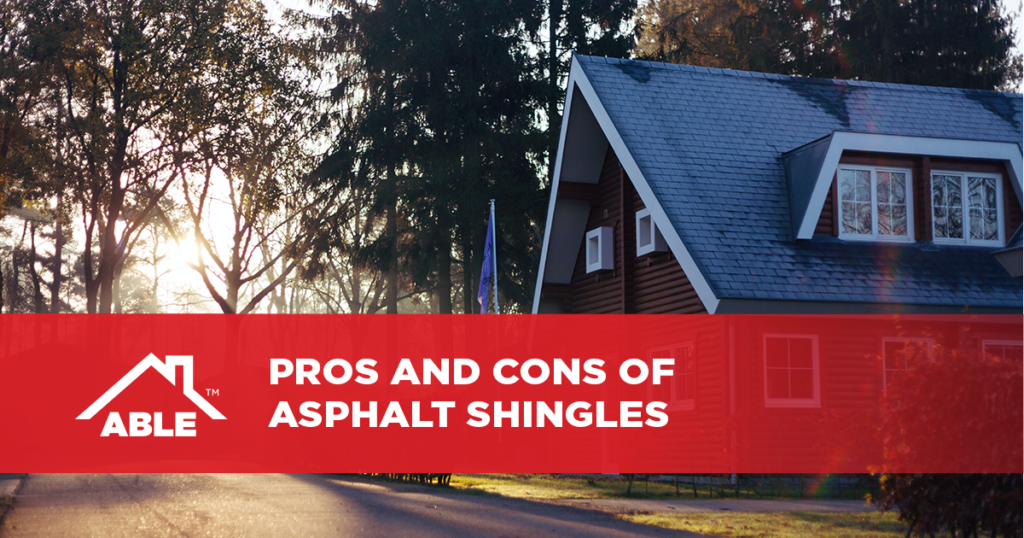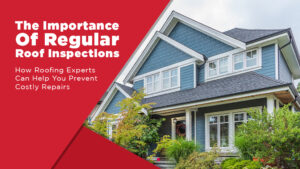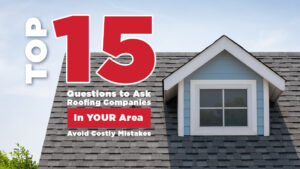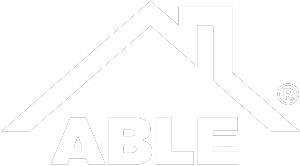Traditionally, asphalt shingles are the most common type of roofing used in residential homes across the United States. That being said, this doesn’t mean that asphalt is the perfect roofing material—it comes with several upsides, but asphalt shingles carry a number of downsides, as well. Therefore, before deciding whether or not you would like to install an asphalt roof, it’s important to consider the pros and cons of this popular material.
Different roofing materials will suit different homes, and there is no one true “perfect” option. No matter who you are, however, it’s essential to ensure the strength and durability of your roof—without this protection, your home could suffer serious damage, such as water damage or flooding. If your roof needs constant repair, not only will this compromise the safety of your home, but it is also an expensive problem to deal with. To avoid these issues, it’s a good idea to have the best possible roofing material installed in the first place.
Could asphalt shingles be the ideal roofing material for you?
What are asphalt shingles?
The base of an asphalt shingle is constructed of either an organic material or fiberglass. This base is saturated in asphalt before it is covered in even more asphalt, either on a single side or both sides. Finally, the top of the shingle is coated in a mixture of schist, mica, slate, quartz, stone, or ceramic. The back is instead covered in talc, sand, or mica. This helps prevent the individual shingles from getting stuck together.
Although there are numerous types of asphalt shingles to choose from, the most common is known as “three-tab” shingling. This name is a reference to how the shingle is cut and how it is installed. Shingles are stylistically versatile and come in a fair variety of colors, shapes, and styles.
The pros of asphalt shingling
Let’s begin by discussing the positives of asphalt shingles, which may make them a superior option to other roofing materials.
- Asphalt is quite inexpensive to install
This is possibly one of the upsides that most commonly leads homeowners to install asphalt shingles.
In terms of installation cost, asphalt is considerably more affordable than other popular materials. If you’re on a budget but urgently need a new roof, then asphalt shingles are likely the pick for you.
- Shingles do provide curb appeal
Of course, functionality isn’t the only variable you’re probably considering as you decide upon a roofing material. Most homeowners also care about the appearance or curb appeal of their property, and the roof you select can have a powerful impact. In addition, if you ever plan on selling your home, then its appearance becomes even more critical—curb appeal is a vital factor in determining the overall value of a property.
- Asphalt shingles are a reasonably flexible option
This means you can likely find shingles that perfectly suit the aesthetics, style, and color scheme of your home. In addition, you can find shingles in an array of styles, including (but not limited to) three-tab, laminated, and even premium varieties. In any case, it isn’t hard to install shingles that look perfectly in place on top of your home.
- Installing asphalt shingles is quick and easy
Not only is installation cheap, but it’s also a quick process to have asphalt shingles installed—and considering how much stress a roofing replacement can add to your day-to-day life, this can be desirable.
Most notably, asphalt shingles are easy to cut and lighter than many other roofing materials. This means that the roofing team won’t need to perform much prep work before they can install your new roof. There also isn’t any requirement for special tools or equipment. Not only do these variables make the installation process faster and simpler, but they also contribute to the lower cost of installing asphalt shingles.
- You can easily replace asphalt shingles
Although needing to re-install your roof isn’t desirable, it might still be a necessity in the future. As such, it’s a possibility that you should account for if you’d like to save your future self a headache.
Replacing shingles doesn’t even need to entail replacing your entire roof. It’s possible to replace a single shingle at a time if they become damaged without needing to tear out the roof and start from scratch.
The quick and simple installation process supports this ease of replacement.
The cons of asphalt shingling
Although there are numerous positives to installing an asphalt roof, there are also some disadvantages worth considering. In addition, certain downsides may impact certain individuals more than others—for instance, the weather conditions where you live could make some cons more detrimental.
- Shingles are more susceptible to wind damage
If you live in a region with frequent high winds, asphalt shingles may not be the most practical material for you. Although this is mainly applicable to cheaper varieties of asphalt shingles, they tend to be more vulnerable to uplift.
Strong winds can cause individual shingles to detach from your roof, which in turn makes your roof more susceptible to developing leaks. A leaky roof is a big problem—leaks can lead to a variety of serious issues, including mold and severe water damage. In addition, much of the damage caused by leaks will require pricey repairs, especially if they go unnoticed and are left to worsen over time.
- Asphalt can crack
Asphalt shingles are a light roofing material, as was mentioned earlier. While this leads to several perks, it can also cause problems for your roof in other areas. Notably, asphalt is light enough that it is more vulnerable to cracking compared to other roofing materials.
If your shingles are exposed to extreme fluctuations in temperature, then cracks are even more likely to begin forming. These fluctuations can lead to your shingles expanding and contracting, which eventually could cause cracks in the material. However, high temperatures can also promote the cracking of asphalt shingles, even without fluctuation.
So, if you reside in an area with extreme temperatures, make sure to take the possibility of cracking into account.
- Shingles shouldn’t be installed in cold weather
Generally speaking, it’s recommended that homeowners install asphalt shingles when the weather is warm. However, this can be seen as inconvenient as it restricts the times of the year when shingles can be installed. If you need an urgent roof replacement in the dead of winter, asphalt shingles might not be the most appropriate material.
This is especially true if the temperature outside is below freezing. These cold temperatures can cause the shingles to become damaged as they are being installed. As the temperature warms back up, this can also cause the shingles to become misaligned or be knocked out of place due to the resulting expansion.
- Shingles don’t look unique
Although shingles can look nice and have the ability to support the curb appeal of your property, they’re not necessarily the most distinctive option.
Other roofing materials, such as metal, tend to be better known for their extreme level of customizability. Although it’s easy to find asphalt shingles that fit the style and color of most homes, it’s going to be challenging to step outside the box.
If you’re hoping to make your home stand out from the rest on your block, then asphalt shingles aren’t the most effective way to accomplish that.
- Asphalt shingles don’t have the highest longevity
Are you hoping to install your new roof and then never have to go through the process again? If so, then keep the low longevity of asphalt shingles in mind before choosing this material.
Asphalt shingles are lighter and cheaper than other roofing materials, but this also means that they’re more likely to become damaged or wear down over time. Typically, you can expect properly installed shingles to last for up to 20 years before they need to be replaced. This can be compared to the longevity of metal roofing, for instance—that material can last for up to 70 years if it’s correctly installed.
Other types of asphalt shingles
Fortunately, if you enjoy the appearance of shingles on your home, there are options other than traditional asphalt shingling. Fiberglass asphalt and polymer modified asphalt are popular alternatives.
These other types of asphalt tend to be more durable than the traditional variety and are considerably more resistant to weather. Polymer-modified asphalt, in particular, is an excellent pick if you live in an area with frequent extreme weather conditions. Whether you’re faced with wind, hail, or heavy rain, polymer-modified asphalt is better able to hold up than traditional asphalt shingles.
Contact Able Roof Today
Do you believe that asphalt shingles are the roofing material for you—more specifically, fiberglass asphalt or polymer-modified asphalt shingles? If you’re in Central Ohio, then be sure to reach out to Able Roof. Our expert roofers can quickly and efficiently install your brand-new shingles in such a way that maximizes their longevity. Or, you can look into our other roofing options instead.
Able Roof even offers free estimates through our website.
